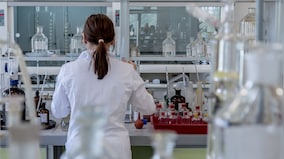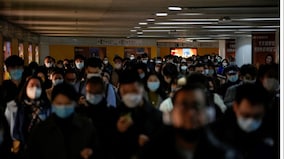On May 9 this year, TV channels, news portals and papers carried the news as well as their own detailed analysis of AstraZeneca and the reason they might have announced the global withdrawal of its Covid-19 vaccine.
In India, people, who got themselves administered with Covishield, the vaccine produced by the UK-based pharmaceutical giant, started getting worried.
AstraZeneca cited a surplus of newer vaccine options as the primary reason of the global withdrawal of its Covid vaccine, which was marketed under the brand names Covishield and Vaxzevria, and were developed in collaboration with the University of Oxford.
For the unversed, in India, Covishield was manufactured by the Serum Institute of India (SII), a Pune-based vaccine manufacturing company, under a licensing agreement with AstraZeneca.
The reason behind the paranoia of people over the withdrawal announcement was the fact that it came just days after AstraZeneca, for the first time, admitted in a court of law that its Covid-19 vaccine, may have led to a rare, deadly side effect: Thrombosis with Thrombocytopenia syndrome (TTS).
However, SII, which is the world’s largest vaccine manufacturer by number of doses produced and sold globally, had stopped the production of Covishield as early as December 2021 citing low demand.
“With India achieving high vaccination rates in 2021 and 2022, coupled with the emergence of new mutant variant strains, the demand for previous vaccines diminished significantly. Consequently, since December 2021, we stopped the manufacturing and supply of additional doses of Covishield,” a SII spokesperson had said earlier this month.
“From the outset, we have disclosed all rare to very rare side effects, including Thrombosis with Thrombocytopenia Syndrome, in the packaging insert in 2021,” the spokesperson added.
Amid this furore that has led to a lot of panic and tension among the masses, Adar Poonawalla, CEO of SII, in an exclusive interview with Firstpost highlighted some of the biggest challenges in vaccine manufacturing, especially during health emergencies and pandemics.
Biggest challenges in vaccine manufacturing
Poonwalla said, “Vaccine manufacturing has its own share of challenges, from regulatory approvals, sourcing of raw materials, robust infrastructure and logistics seamlessly supporting these operations, to the final product, everything needs to be addressed.”
“Ensuring production and dissemination in a sanitary environment and safeguarding personnel directly involved in the production line hold the topmost priority,” he added.
“Furthermore, one of the most critical challenges is to build a robust infrastructure that provides a seamless management of all these operations,” the SII CEO said.
SII cervical cancer vaccine affordable & accessible
The push for vaccination against cervical cancer, the second most common type of cancer diagnosed among women in India, was one of the priority proposals made by the Government of India in the Interim Budget 2024.
Tabling the Budget 2024 on February 1, Finance Minister Nirmala Sitharaman said the Prime Minister Narendra Modi-led Indian government will encourage vaccination against the human papillomavirus (HPV), which leads to cervical cancer, among girls aged 9-14. It is seen as a game changer move towards the disease that claims life of more than 77,000 women in India each year.
Poonawalla, told Firstpost, “SII acknowledges the significant burden of cervical cancer in India and recognises its crucial role in combating this issue through vaccination. We not only underscore the importance of early vaccination but also strive to educate and empower communities.”
SII has developed and manufactured India’s first indigenously developed vaccine Cervavac for prevention of cervical cancer.
Poonawalla said, Cervavac, India’s first indigenous quadrivalent, gender-neutral vaccine is affordable and accessible compared to other vaccines which are available in the market.
“Cervavac is priced at Rs 2,000 per dose. It offers affordability and accessibility to a broader population, as compared to other available vaccines,” the SII CEO said.
Cervavac helping prevent cervical cancer in women
Poonawalla further said SII’s HPV vaccine is a “significant stride in preventing cervical cancer in women.”
“We have also witnessed a positive uptake in the market as well. We will continue to keep our focus on building awareness about the silent threat of HPV and highlighting the crucial role of early vaccination in saving lives,” he said.
SII is establishing a unique ecosystem
Manufacturing of vaccines is not as easy as we think. It requires a lot of research, multiple trials and testing, gauging effects and side effects before they can be sold in the market.
Sharing a few details about the team behind manufacturing a vaccine, Poonawalla said, “SII has a team of highly qualified and motivated professionals as part of our core R&D (research and development) group. Our R&D efforts focus on developing vaccines tailored to the specific needs of different segments of the population (India and worldwide) as well as improving the methods of vaccine delivery.”
“Besides, our R&D initiatives also include development of better adjuvants, heat stable vaccines, conjugate vaccines, monoclonal antibodies and others,” Poonawalla said.
“At SII, we are establishing a unique ecosystem with capabilities of research in vaccines and biologics. This will enable us to address future innovations and the specific needs of diseases prevalent in low- and middle-income countries (LMICs),” he added.
“We look forward to getting the best available talent and equipping them with the latest technology to foster global partnerships and collaborations,” he further said.
How SII is helping India in polio vaccination
There were reports in April stating that French drug maker Sanofi had stopped production of its injectable poliomyelitis vaccine, or IPV, in December 2023 and had shut down its manufacturing plant in India.
IPV has been a crucial tool of India in its efforts to eradicate polio. In India, IPV is, or rather was, only manufactured by two companies - Sanofi Pasteur and SII.
Sanofi used to cater to more than 80 per cent of India’s IPV dose requirements, but with its shut down, the burden has now shifted to SII, which started supplying polio vaccines in 2021.
Speaking about how SII manages to maintain India’s polio-free status, Poonawalla said: “At present, we supply half of 20 million doses of IPV to the government’s immunisation programme.”
“Currently, we have a production capacity of approximately 60-70 million doses of IPV annually. We are prepared to provide additional doses as needed, which is crucial for maintaining India’s polio-free status,” he said.
“Being the sole domestic supplier for injectable polio vaccine at the moment, we have ensured that we have enough stock for the Indian population as and when the health ministry floats new tenders,” the SII CEO further said.









)
)
)
)